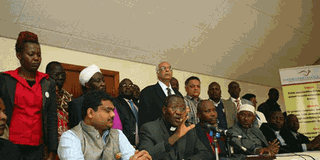When will you audit voters list? Clergy ask IEBC chiefs

Bishop Alfred Rotich, Vice Chairman of the Kenya Conference of Catholic Bishops (third left), leads the Inter-Religious Council of Kenya in a press conference at Jumuia Place in Nairobi on December 14, 2016. PHOTO | EVANS HABIL | NATION MEDIA GROUP.
What you need to know:
The joint statement was read by Sheikh Adan Wachu, the Supreme Council of Muslims of Kenya (Supkem) secretary general, and Archbishop Stephen Marete of the Organisation of African Instituted Churches.
But in a quick response, however, the IEBC said the audit would start on Friday December 16.
“The audit had delayed because the successful bidder signs a contract after 14 days. It is a legal requirement and this comes into effect on December 16,” said the commission’s communication director Andrew Limo in a text message.
The commission plans a second phase of mass voter registration between January 16 and end February 15, targeting over 6.7 million eligible Kenyans.
The religious team on Wednesday also called on IEBC to block any politician who has engaged in hate speech from the 2017 General Election, warning that some of them were now organising gangs to attack opponents.
Religious leaders have asked the electoral commission to clarify whether its planned audit of voters' register will happen concurrently with the second phase of voter registration.
The leaders on Wednesday said they were worried that though planned for this month, the scrutiny had not been done and the Independent Electoral and Boundaries Commission had not given directions on when it would start.
The clergy, under the Inter-Religious Council of Kenya chaired by Bishop Alfred Rotich, also asked the commission to be open about its preparations for the 2017 polls.
"We especially are concerned that the audit of the voter's register, which is scheduled to take place this month, is yet to commence,” they said in a joint statement read in Nairobi.
IEBC RESPONDS
“Considering that the mass registration of voters is to be preceded by the audit of the register, we urge the commission secretariat to clarify whether the two processes will be undertaken concurrently.”
The joint statement was read by Sheikh Adan Wachu, the Supreme Council of Muslims of Kenya (Supkem) secretary general, and Archbishop Stephen Marete of the Organisation of African Instituted Churches.
But in a quick response, however, the IEBC said the audit would start on Friday December 16.
“The audit had delayed because the successful bidder signs a contract after 14 days. It is a legal requirement and this comes into effect on December 16,” said the commission’s communication director Andrew Limo in a text message.
SECOND PHASE
The commission plans a second phase of mass voter registration between January 16 and end February 15, targeting over 6.7 million eligible Kenyans.
The religious team on Wednesday also called on IEBC to block any politician who has engaged in hate speech from the 2017 General Election, warning that some of them were now organising gangs to attack opponents.
The new demand by the team could lock out at least 10 politicians who have been accused of hate speech, charged with it or are being investigated for hate.
Kenyans, the said, should not to allow politicians to take them back to a path they said could lead to post-election violence, akin to the 2007 disputed polls.
CIVIC EDUCATION
“We the religious leaders are concerned with the hate mongering and divisive political rhetoric among political leaders,” they said.
“Political leaders are now organising gangs to attack supporters of other leaders in this downward spiral of violence and denials.”
The religious leaders said they were committed to their of educating Kenyans on their rights and Kenya's electoral system ahead of the polls.
Bishop Rotich, however, refused to comment on an allegation by President Uhuru Kenyatta that foreign powers were plotting to influence the outcome of the polls through funding “in the guise of civic education.”
DONOR CASH
“We, the religious leaders, will continue with our civic education with or without political utterances,” Bishop Rotich of the Kenya Conference of Catholic Bishops said.
“As the religious team, we have vowed and we continue to account for any donor money we receive and its use in promotion of civic education for the Kenyan people.”
The council asked for a national dialogue on corruption that they said was a “cancer eating to the core of Kenya as a nation.”
“We are concerned that despite the massive investment in a myriad of anti-corruption agencies, corruption continues to grow rather than diminish. Especially of note is the growing trend of land grabbing from private individuals,” the religious leaders noted.
TAKING BRIBES
On road safety, the religious leaders accused the various road agencies of taking bribes and endangering the lives of Kenyans.
“We call upon the ministry, the National Transport and Safety Authority and the traffic police to take the lives of Kenyans seriously,” they said.
“The tradition of taking bribes from road users to allow them to drive dangerously must be stopped now.”
The leaders condoled with the families of those who perished at the Naivasha accident, which has so far claimed 43 lives.





